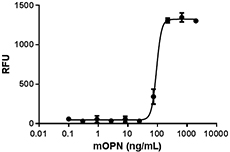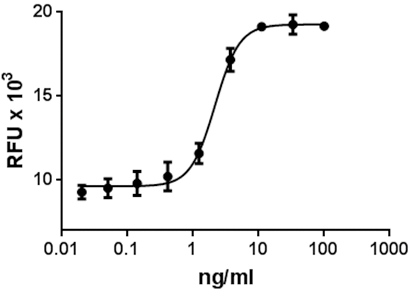- Regulatory Status
- RUO
- Other Names
- Tumor necrosis factor ligand superfamily, member 12, TNFSF12, YNF-related weak inducer of apoptosis, Apo-3 ligand (Apo3L).
- Ave. Rating
- Submit a Review
- Product Citations
- publications
| Cat # | Size | Price | Quantity Check Availability | Save | ||
|---|---|---|---|---|---|---|
| 566402 | 5 µg | 76€ | ||||
| 566404 | 25 µg | 184€ | ||||
This product is not available for shipping outside of the United States.
TWEAK (TNFSF12) is a "TNF-like weak inducer" of apoptosis through a non-death domain-dependent mechanism. TWEAK is a type II membrane protein which exhibits a single internal hydrophobic domain of 27 amino acids in the N-terminal region. TWEAK is proteolytically cleaved to produce a soluble cytokine that signals as a trimerized molecule. Fibroblast growth factor-inducible 14 (Fn14)/TWEAKR has been described as a receptor for TWEAK, and it is associated with proliferation of endothelial cells and angiogenesis. However, TWEAK mediates signal transduction and linear differentiation of monocyte/macrophage cells lacking Fn14/TWEAKR, suggesting that such cells contain an alternative TWEAK receptor. Elevated levels of TWEAK and/or Fn14 have been found to be associated with the pathogenesis of rheumatoid arthritis, skeletal muscle wasting, systemic lupus erythematosus, multiple sclerosis, stroke, neuroinflammation and neurodegeneration, and several types of cancer. The pathological functions of TWEAK are primarily attributed to its ability to induce the expression of several proinflammatory cytokines, chemokines, cell adhesion molecules, and matrix-degrading enzymes mainly through the activation of NF-κB, a major proinflammatory transcription factor. It has been described that CD163 (a scavenger receptor) might be acting as a receptor decoy for the ligand TWEAK.
Product DetailsProduct Details
- Source
- Human TWEAK, amino acids Lys97-His249 (Accession# Q4ACW9), was expressed in E. coli.
- Molecular Mass
- The 154 amino acid N-terminal methionylated recombinant protein has a predicted molecular mass of 17 kD.
- Purity
- >98%, as determined by Coomassie stained SDS-PAGE.
- Formulation
- Lyophilized
- Endotoxin Level
- Less than 0.1 ng per µg of protein.
- Storage & Handling
- Unopened vial can be stored at -20°C or -70°C. For maximum results, quick spin vial prior to opening. Reconstitute in 10 mM sodium phosphate, pH 7.5 to a concentration of 1.0 mg/ml. Do not vortex. It is recommended to further dilute in a buffer containing a carrier protein such as 0.1% BSA and store working aliquots at -20°C to -80°C. Avoid repeated freeze/thaw cycles.
- Activity
- ED50 < 10 ng/ml, corresponding to a specific activity of > 1 x 107 units/mg, as determined by the dose dependent stimulation of production of IL-8 by human PBMC.
- Application
-
Bioassay
- Application Notes
-
BioLegend's Recombinant Human CD255 (TWEAK) has been reported to induce cardiomyoctye proliferation in vivo.1
-
Application References
(PubMed link indicates BioLegend citation) -
- Novoyatleva T, et al. 2010. Cardiovasc. Res. 85:681. PubMed
- Product Citations
-
Antigen Details
- Distribution
- Monocytes, macrophages, and TWEAK transcripts widely expressed and abundant in most tissues.
- Interaction
- Endothelial cells, macrophages, astrocytes.
- Ligand/Receptor
- Fibroblast growth factor inducible 14 (Fn14)/TWEAKR (CD266)
- Bioactivity
- TWEAK induces interleukin-8 synthesis in a number of cell lines, and and IL-6 and IL-8 in human astrocytes in vitro. TWEAK acts cooperatively with bFGF to promote EC proliferation, migration and capillary tube morphogenesis. TWEAK attenuates the transitio
- Biology Area
- Angiogenesis, Apoptosis/Tumor Suppressors/Cell Death, Cell Biology, Immunology
- Molecular Family
- CD Molecules, Cytokines/Chemokines
- Antigen References
-
1. Chicheportiche Y, et al. 1997. J. Biol. Chem. 272:32401.
2. Wiley SR, et al. 2001. Immunity 15:837.
3. Jakubowski A, et al. 2002. J. Cell. Sci. 115:267.
4. Bover LC, et al. 2007. J. Immunol. 178:8183.
5. Kumar M, et al. 2009. J. Immunol. 182:2439.
6. Van Gorp H, et al. 2010. Mol. Immunol. 47:1650. - Gene ID
- 8472 View all products for this Gene ID
- UniProt
- View information about TWEAK on UniProt.org
Related FAQs
- Why choose BioLegend recombinant proteins?
-
• Each lot of product is quality-tested for bioactivity as indicated on the data sheet.
• Greater than 95% Purity or higher, tested on every lot of product.
• 100% Satisfaction Guarantee for quality performance, stability, and consistency.
• Ready-to-use liquid format saves time and reduces challenges associated with reconstitution.
• Bulk and customization available. Contact us.
• Learn more about our Recombinant Proteins. - How does the activity of your recombinant proteins compare to competitors?
-
We quality control each and every lot of recombinant protein. Not only do we check its bioactivity, but we also compare it against other commercially available recombinant proteins. We make sure each recombinant protein’s activity is at least as good as or better than the competition’s. In order to provide you with the best possible product, we ensure that our testing process is rigorous and thorough. If you’re curious and eager to make the switch to BioLegend recombinants, contact your sales representative today!
- What is the specific activity or ED50 of my recombinant protein?
-
The specific activity range of the protein is indicated on the product datasheets. Because the exact activity values on a per unit basis can largely fluctuate depending on a number of factors, including the nature of the assay, cell density, age of cells/passage number, culture media used, and end user technique, the specific activity is best defined as a range and we guarantee the specific activity of all our lots will be within the range indicated on the datasheet. Please note this only applies to recombinants labeled for use in bioassays. ELISA standard recombinant proteins are not recommended for bioassay usage as they are not tested for these applications.
- Have your recombinants been tested for stability?
-
Our testing shows that the recombinant proteins are able to withstand room temperature for a week without losing activity. In addition the recombinant proteins were also found to withstand four cycles of freeze and thaw without losing activity.
- Does specific activity of a recombinant protein vary between lots?
-
Specific activity will vary for each lot and for the type of experiment that is done to validate it, but all passed lots will have activity within the established ED50 range for the product and we guarantee that our products will have lot-to-lot consistency. Please conduct an experiment-specific validation to find the optimal ED50 for your system.
- How do you convert activity as an ED50 in ng/ml to a specific activity in Units/mg?
-
Use formula Specific activity (Units/mg) = 10^6/ ED50 (ng/mL)
 Login / Register
Login / Register 














Follow Us